九年级英语竞赛试题-A卷(含答案)
- 格式:doc
- 大小:102.50 KB
- 文档页数:9
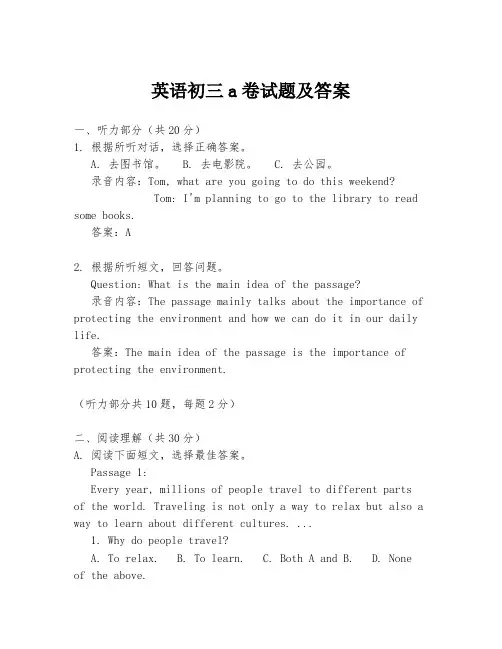
英语初三a卷试题及答案一、听力部分(共20分)1. 根据所听对话,选择正确答案。
A. 去图书馆。
B. 去电影院。
C. 去公园。
录音内容:Tom, what are you going to do this weekend?Tom: I'm planning to go to the library to read some books.答案:A2. 根据所听短文,回答问题。
Question: What is the main idea of the passage?录音内容:The passage mainly talks about the importance of protecting the environment and how we can do it in our daily life.答案:The main idea of the passage is the importance of protecting the environment.(听力部分共10题,每题2分)二、阅读理解(共30分)A. 阅读下面短文,选择最佳答案。
Passage 1:Every year, millions of people travel to different parts of the world. Traveling is not only a way to relax but also a way to learn about different cultures. ...1. Why do people travel?A. To relax.B. To learn.C. Both A and B.D. None of the above.答案:CB. 阅读下面的对话,回答以下问题。
Dialogue:Mary: I heard you went to the museum last weekend. What did you see there?Tom: Yes, I saw some beautiful paintings and sculptures.1. Where did Tom go last weekend?A. The museum.B. The zoo.C. The park.D. The cinema.答案:A(阅读理解部分共15题,每题2分)三、完形填空(共20分)Read the following passage and fill in the blanks with the appropriate words.In a small village, there was an old man who was very kind. He always helped people in need. One day, he found a lost child and took him home. The child was very __1__, but the old man comforted him and found his parents.1. A. happy B. sad C. excited D. scared答案:D(完形填空部分共10题,每题2分)四、语法填空(共10分)Fill in the blanks with the correct form of the words given in brackets.Tom is a very __1__ (friend) boy. He always helps others.Last week, he helped an old lady __2__ (cross) the busy street. The old lady was very __3__ (thank) for his kindness.1. friendly2. cross3. thankful(语法填空部分共5题,每题2分)五、书面表达(共20分)Write a short passage about "My Favorite Season" in at least 60 words. (Write your own passage based on the prompt)参考答案:My favorite season is spring. The weather is warm and the flowers are blooming everywhere. I love to go out for a walk and enjoy the fresh air. It's also a great time for planting trees and flowers. Spring is the season of growth and new beginnings.结束语:以上就是本次英语初三a卷试题及答案的全部内容。
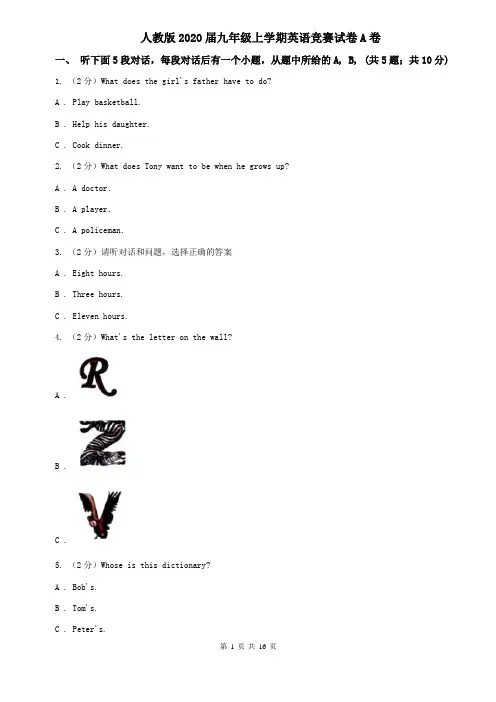
人教版2020届九年级上学期英语竞赛试卷A卷一、听下面5段对话,每段对话后有一个小题,从题中所给的A, B, (共5题;共10分)1. (2分)What does the girl's father have to do?A . Play basketball.B . Help his daughter.C . Cook dinner.2. (2分)What does Tony want to be when he grows up?A . A doctor.B . A player.C . A policeman.3. (2分)请听对话和问题,选择正确的答案A . Eight hours.B . Three hours.C . Eleven hours.4. (2分)What's the letter on the wall?A .B .C .5. (2分)Whose is this dictionary?A . Bob's.B . Tom's.C . Peter's.二、听下面三段对话或独白,每段对话或独白后有几个小题,从题中所给 (共3题;共20分)6. (6分)听对话,回答问题(1)What's the probable relationship between the two speakers?A . Classmates.B . Teacher and student.C . Neighbors.(2)What does Brian want to do in the future?A . To be an astronaut.B . To be a scientist.C . To be a teacher.(3)Why are they hiving a party this weekend?A . To celebrate Mrs. Feng's birthday.B . To celebrate Brian's birthday.C . To celebrate the end of junior high school.7. (6分)听下面一段对话,回答问题。
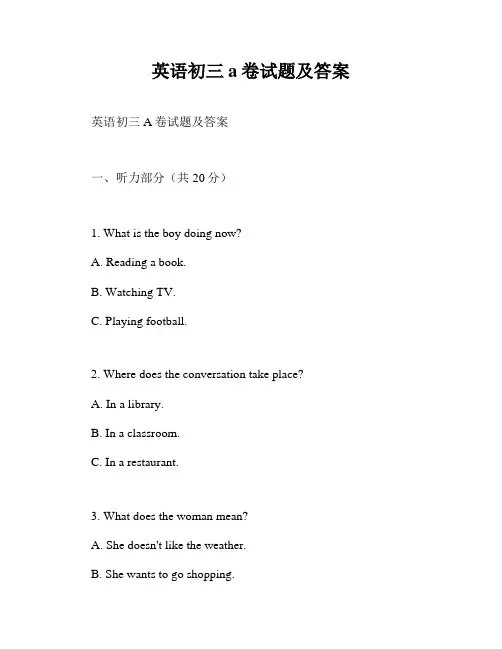
英语初三a卷试题及答案英语初三A卷试题及答案一、听力部分(共20分)1. What is the boy doing now?A. Reading a book.B. Watching TV.C. Playing football.2. Where does the conversation take place?A. In a library.B. In a classroom.C. In a restaurant.3. What does the woman mean?A. She doesn't like the weather.B. She wants to go shopping.C. She is looking for her umbrella.4. How much will the man pay for the tickets?A. $20.B. $30.C. $40.5. What is the woman's opinion about the movie?A. It's too long.B. It's exciting.C. It's boring.二、单项选择(共15分)6. The teacher asked us ________ late for school.A. don't beB. not to beC. not beD. be not7. - Have you finished your homework?- Not yet, but I'll finish it ________.A. in a momentB. after a momentC. for a momentD. at the moment8. The book is ________ interesting ________ I can't put it down.A. so, thatB. such, thatC. too, toD. enough, to9. - ________ you please pass me the salt?- Sure, here you are.A. CouldB. WouldC. MightD. Must10. She ________ the piano when I entered the room.A. is playingB. was playingC. playsD. played11. ________ the weather is fine, we can go out for a picnic.A. BecauseB. IfC. UnlessD. Although12. The old man ________ in the park every morning.A. takes a walkB. takes walksC. is taking a walkD. is taking walks13. - ________ you ever ________ to America? - No, never.A. Have, beenB. Do, goC. Are, goingD. Did, go14. The boy is too young ________ by himself.A. to look afterB. looking afterC. looked afterD. to be looked after15. ________ is the population of China?A. How manyB. How muchC. WhatD. Which三、完形填空(共20分)阅读下面的短文,掌握其大意,然后从16-25各题所给的选项中,选择最佳选项。
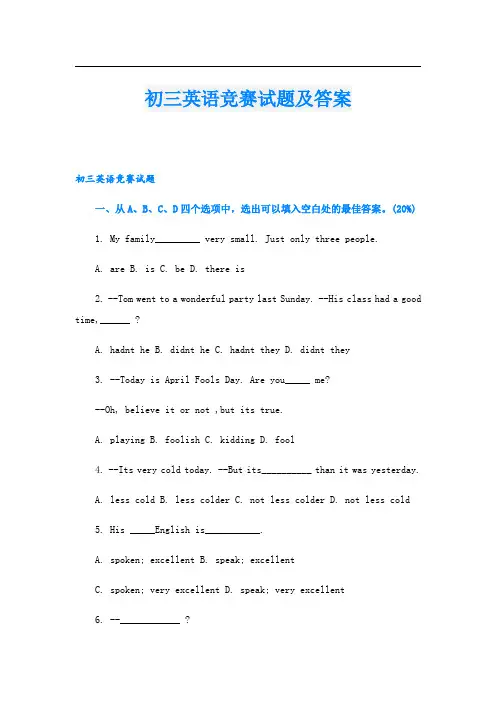
初三英语竞赛试题及答案初三英语竞赛试题一、从A、B、C、D四个选项中,选出可以填入空白处的最佳答案。
(20%)1. My family_________ very small. Just only three people.A. areB. isC. beD. there is2. --Tom went to a wonderful party last Sunday. --His class had a good time,______ ?A. hadnt heB. didnt heC. hadnt theyD. didnt they3. --Today is April Fools Day. Are you_____ me?--Oh, believe it or not ,but its true.A. playingB. foolishC. kiddingD. fool4. --Its very cold today. --But its__________ than it was yesterday.A. less coldB. less colderC. not less colderD. not less cold5. His _____English is___________.A. spoken; excellentB. speak; excellentC. spoken; very excellentD. speak; very excellent6. --____________ ?--Not too well ,Im afraid.A. How do you doB. How is your schoolC. How are things getting onD. What are you7. --Please dont make a noise. -- _____ . Ill be as quiet as mouse.A. Yes, I doB. No, I dontC. Yes, I willD. No, I wont8. Your skirt needs_____ . You need______ it.A. washing ;to washB. to wash; washingC. washing; washingD. to wash; to wash9.--Did your sister pass the exam?--She failed, so she is in low spirits,--Im sorry for her. --______.A. I would think soB. The pleasure is mineC. Thank youD. Youre welcome10. She _____ terrible at this time yesterday.A. feelsB. feltC. is feelingD. was feeling11. He said nothing at the meeting because he wanted to let the sleeping lie.A. dogsB. catsC. tigersD. pigs12. ______ weather it is!A. What brokenB. What a brokenC. How breakingD. How broken13. If you dont go , ______.A. Nor will IB. So will IC. Neither do ID. So do I14. He learned a lot when he lived in the country for a holiday.A. got to know a lotB. did muchC. received a lotD. knows a lot15. He stands first in his class. It means_____.A. He stands up firstB. Hes the best student in his classC. Hes the tallest in his classD. He sits in the front of his classroom.16.--Im very sorry Ive lost the novel I borrowed from you.-- ________.-- I guess Id better not. I dont want to let it happen again.A. Thats all right. I dont want it.B. Its no good crying over spilt milk, so forget it.C. It doesnt matter. Would you like the new one?D. Don t worry. I can get a cheaper one.17. He worked hard every day as a lawyer and went to parties and dances every night he was burning the candles at both ends.A. 疲劳过度B. 积劳成疾C. 意志消沉D. 功大于过18. He asked me if there was _____ to read.A. enough easy somethingB. easy enough somethingC. something enough easyD. something easy enough19. –Can you post the letter for me on your way home?--______.A. Its all right.B. GoodC. No problemD. I hope so20. What did you ____ at the meeting yesterday?A. speakB. sayC. tellD. talk。
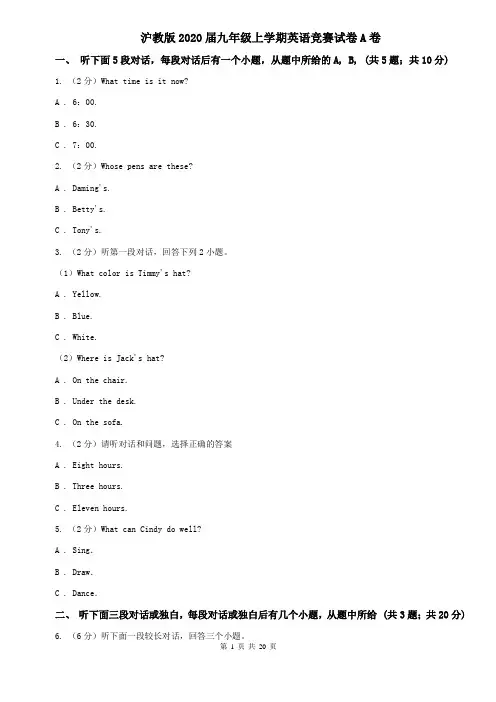
沪教版2020届九年级上学期英语竞赛试卷A卷一、听下面5段对话,每段对话后有一个小题,从题中所给的A, B, (共5题;共10分)1. (2分)What time is it now?A . 6:00.B . 6:30.C . 7:00.2. (2分)Whose pens are these?A . Daming's.B . Betty's.C . Tony's.3. (2分)听第一段对话,回答下列2小题。
(1)What color is Timmy's hat?A . Yellow.B . Blue.C . White.(2)Where is Jack's hat?A . On the chair.B . Under the desk.C . On the sofa.4. (2分)请听对话和问题,选择正确的答案A . Eight hours.B . Three hours.C . Eleven hours.5. (2分)What can Cindy do well?A . Sing.B . Draw.C . Dance.二、听下面三段对话或独白,每段对话或独白后有几个小题,从题中所给 (共3题;共20分)6. (6分)听下面一段较长对话,回答三个小题。
(1)When is the film?A . On Saturday afternoon.B . On Sunday evening.C . On Sunday afternoon.(2)How many students will go to the cinema then?A . 2.B . 3.C . 4.(3)Who is in the film?A . Lingling.B . Tony.C . Jackie Chan.7. (6分)听第二段对话,回答小题(1)Who is John going to pick up?A . His cousin.B . His friend.C . His sister.(2)How is John going to the airport?A . By bus.B . By car.C . By underground.(3)What's the weather like?A . Rainy.B . Snowy.C . Windy.8. (8分)听独白,回答以下小题。
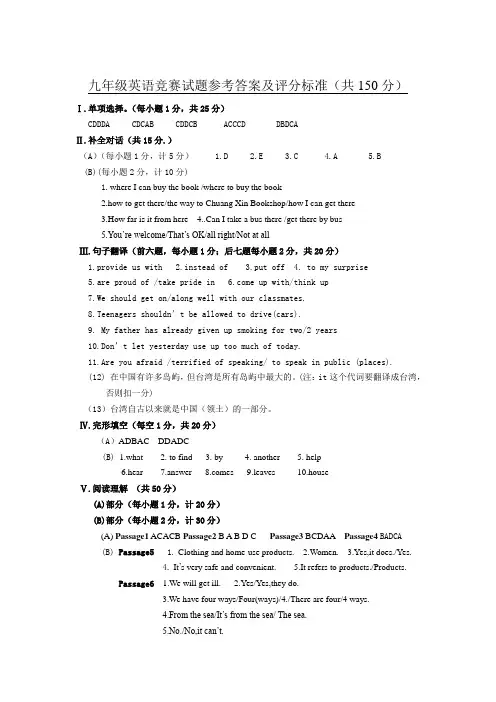
九年级英语竞赛试题参考答案及评分标准(共150分)Ⅰ.单项选择。
(每小题1分,共25分)CDDDA CDCAB CDDCB ACCCD DBDCA Ⅱ.补全对话(共15分.)(A)(每小题1分,计5分) 1.D 2.E 3.C 4.A 5.B(B)(每小题2分,计10分)1.where I can buy the book /where to buy the book2.how to get there/the way to Chuang Xin Bookshop/how I can get there3.How far is it from here4..Can I take a bus there /get there by bus5.You’re welcome/That’s OK/all right/Not at allⅢ.句子翻译(前六题,每小题1分;后七题每小题2分,共20分)1.provide us with2.instead of3.put off4. to my surprise5.are proud of /take pride ine up with/think up7.We should get on/along well with our classmates.8.Teenagers shouldn’t be allowed to drive(cars).9. My father has already given up smoking for two/2 years10.Don’t let yesterday use up too much of today.11.Are you afraid /terrified of speaking/ to speak in public (places).(12) 在中国有许多岛屿,但台湾是所有岛屿中最大的。
(注:it这个代词要翻译成台湾,否则扣一分)(13)台湾自古以来就是中国(领土)的一部分。
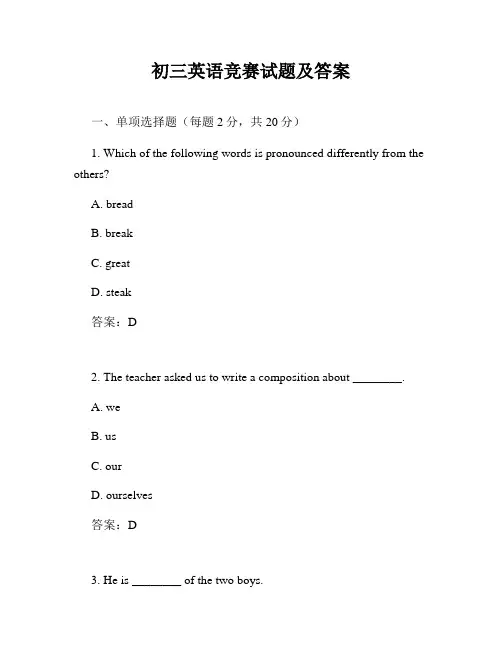
初三英语竞赛试题及答案一、单项选择题(每题2分,共20分)1. Which of the following words is pronounced differently from the others?A. breadB. breakC. greatD. steak答案:D2. The teacher asked us to write a composition about ________.A. weB. usC. ourD. ourselves答案:D3. He is ________ of the two boys.A. tallB. tallerC. tallestD. the taller答案:D4. ________, I have something important to tell you.A. Excuse meB. SorryC. HelloD. Goodbye答案:A5. She ________ her keys in the office, so she had to wait until her husband came home.A. forgotB. leftC. lostD. missed6. The weather in Beijing is getting ________ than before.A. cold and coldB. colder and colderC. more and more coldD. coldest答案:B7. The doctor advised him to give up ________.A. smokeB. smokingC. to smokeD. smoked答案:B8. ________ the help of the teacher, he passed the exam.A. WithC. InD. By答案:A9. The children ________ the boat when they heard someone shouting for help.A. were mendingB. were mendC. were being mendedD. were being mend答案:A10. ________ you ________ your homework yet?A. Have; finishedB. Do; finishC. Did; finishD. Will; finish答案:A二、完形填空(每题2分,共20分)阅读下面的短文,从每题所给的选项中选择一个最佳答案填空。
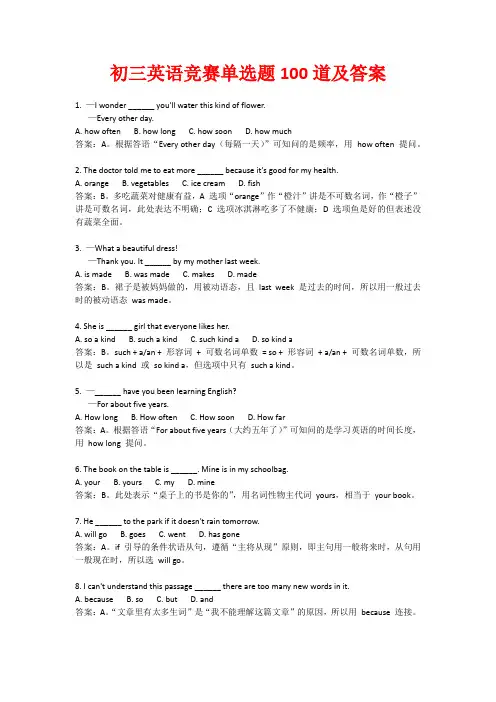
初三英语竞赛单选题100道及答案1. —I wonder ______ you'll water this kind of flower.—Every other day.A. how oftenB. how longC. how soonD. how much答案:A。
根据答语“Every other day(每隔一天)”可知问的是频率,用how often 提问。
2. The doctor told me to eat more ______ because it's good for my health.A. orangeB. vegetablesC. ice creamD. fish答案:B。
多吃蔬菜对健康有益,A 选项“orange”作“橙汁”讲是不可数名词,作“橙子”讲是可数名词,此处表达不明确;C 选项冰淇淋吃多了不健康;D 选项鱼是好的但表述没有蔬菜全面。
3. —What a beautiful dress!—Thank you. It ______ by my mother last week.A. is madeB. was madeC. makesD. made答案:B。
裙子是被妈妈做的,用被动语态,且last week 是过去的时间,所以用一般过去时的被动语态was made。
4. She is ______ girl that everyone likes her.A. so a kindB. such a kindC. such kind aD. so kind a答案:B。
such + a/an + 形容词+ 可数名词单数= so + 形容词+ a/an + 可数名词单数,所以是such a kind 或so kind a,但选项中只有such a kind。
5. —______ have you been learning English?—For about five years.A. How longB. How oftenC. How soonD. How far答案:A。
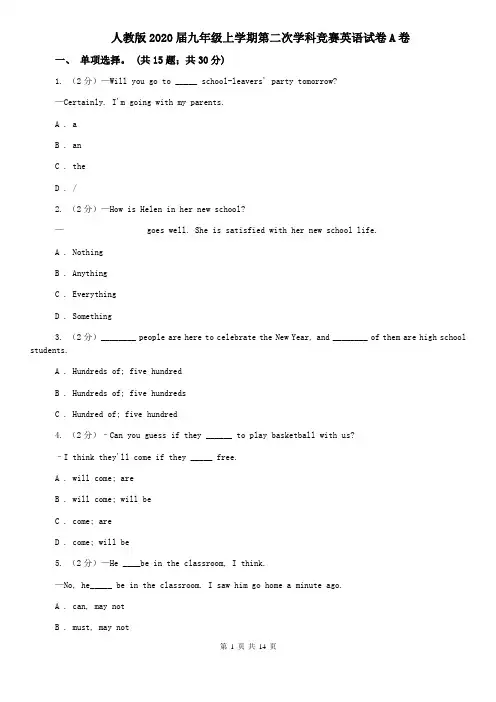
人教版2020届九年级上学期第二次学科竞赛英语试卷A卷一、单项选择。
(共15题;共30分)1. (2分)—Will you go to _____ school-leavers' party tomorrow?—Certainly. I'm going with my parents.A . aB . anC . theD . /2. (2分)—How is Helen in her new school?—goes well. She is satisfied with her new school life.A . NothingB . AnythingC . EverythingD . Something3. (2分)________ people are here to celebrate the New Year, and ________ of them are high school students.A . Hundreds of; five hundredB . Hundreds of; five hundredsC . Hundred of; five hundred4. (2分)–Can you guess if they ______ to play basketball with us?–I think they'll come if they _____ free.A . will come; areB . will come; will beC . come; areD . come; will be5. (2分)—He ____be in the classroom, I think.—No, he_____ be in the classroom. I saw him go home a minute ago.A . can, may notB . must, may notC . may, can'tD . may, mustn't6. (2分)The young man is a friend of mine.A . who I had a talkB . whom I had a talk withC . whom I had a talkD . which I had a talk with7. (2分)—Alice sings .—I think she sings in her class.A . very well, bestB . good, wellC . well, betterD . very good, best8. (2分)—What will you do after school this afternoon?—I ______ basketball with my friends.A . playB . am playingC . will playD . played9. (2分)(2016•黔东南)—It's said that Lin Shuhao, a famous NBA basketball star, will come to our school next week.—Wow! ______! We'll give him a warm welcome then.A . What an excited newsB . How exciting the news isC . What an exciting newsD . How excited the news is10. (2分)This term we have fun ______ English.A . to learnB . learningC . learn11. (2分)He suggested that the meeting _____ put off.A . not beB . should notC . wouldn'tD . be not12. (2分)Don't worry about me while you're away. I will ______ myself.A . take care ofB . take afterC . look forD . look forward to13. (2分)Two of my friends like J.K. Rowling.________ them ________ Mo Yan.A . The rest of;likeB . The rest of;likesC . Rest of;likeD . Rest of;likes14. (2分)—Your pictures are very nice.A . You are rightB . Thank youC . You are OKD . That's OK15. (2分)— Could you tell me_______?— Sure. Walk along this road, you can find it on your left. There you'll see many old things.A . how I can get to the post officeB . where is the aquariumC . if where is a museum near hereD . where I can get a dictionary二、完形填空。
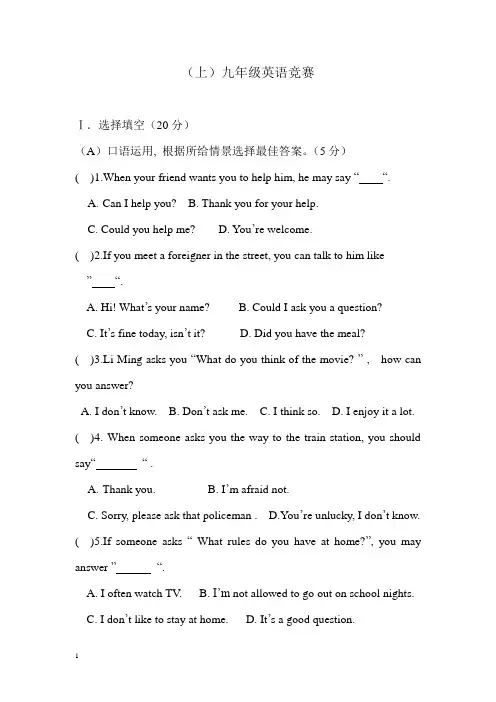
(上)九年级英语竞赛Ⅰ.选择填空(20分)(A)口语运用, 根据所给情景选择最佳答案。
(5分)( )1.When your friend wants you to help him, he may say ――.A.Can I help you?B. Thank you for your help.C. Could you help me?D. You’re welcome.( )2.If you meet a foreigner in the street, you can talk to him like ‖―.A. Hi! What’s your name?B. Could I ask you a question?C. It’s fine today, isn’t it?D. Did you have the meal?( )3.Li Ming asks you ―What do you think of the movie? ‖ , how can you answer?A. I don’t know.B. Don’t ask me.C. I think so.D. I enjoy it a lot. ( )4. When someone asks you the way to the train station, you should say―― .A.Thank you.B. I’m afraid not.C. Sorry, please ask that policeman .D.You’re unlucky, I don’t know. ( )5.If someone asks ―What rules do you have at home?‖, you may answer ‖―.A. I often watch TV.B. I’m not allowed to go out on school nights.C. I don’t like to stay at home.D. It’s a good question.(B) 从A.B.C.D 四个选项中,选出能填入空白处的最佳答案。
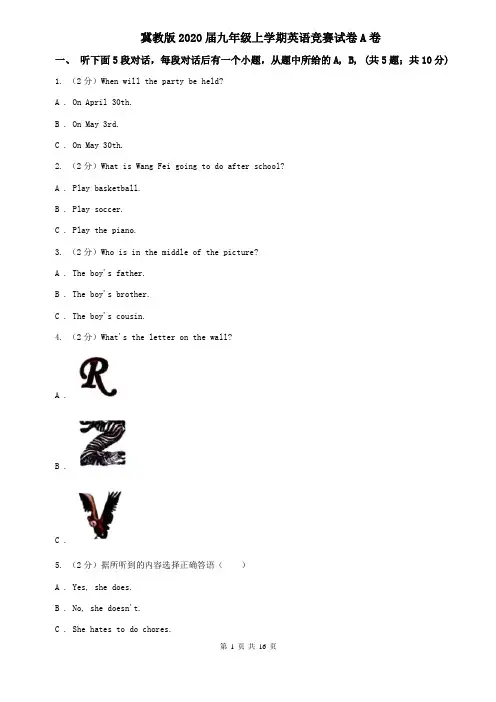
冀教版2020届九年级上学期英语竞赛试卷A卷一、听下面5段对话,每段对话后有一个小题,从题中所给的A, B, (共5题;共10分)1. (2分)When will the party be held?A . On April 30th.B . On May 3rd.C . On May 30th.2. (2分)What is Wang Fei going to do after school?A . Play basketball.B . Play soccer.C . Play the piano.3. (2分)Who is in the middle of the picture?A . The boy's father.B . The boy's brother.C . The boy's cousin.4. (2分)What's the letter on the wall?A .B .C .5. (2分)据所听到的内容选择正确答语()A . Yes, she does.B . No, she doesn't.C . She hates to do chores.二、听下面三段对话或独白,每段对话或独白后有几个小题,从题中所给 (共3题;共20分)6. (6分)听长对话,选择最佳答案(1)When is Mary's birthday?A . On July 23rd.B . On July 24th.C . On July 25th.(2)How long will Mary's parents stay in Beijing?A . For 2 days.B . For 3 days.C . For 4 days.(3)Where will they have a party for Mary?A . At Mary's home.B . At Hill Restaurant.C . At Southeast Center.(4)Who will make a cake?A . Mary's dad.B . Bob's dad.C . Kate's dad.(5)What will Bob bring to the party?A . Some ice-cream.B . Some flowers.C . Some drinks.7. (6分)听对话,回答问题。
北师大版2020届九年级上学期英语竞赛试卷A卷一、听下面5段对话,每段对话后有一个小题,从题中所给的A, B, (共5题;共10分)1. (2分)What's wrong with Susan?A . She has a sore back.B . She has a sore throat.C . She has a fever.2. (2分)What does the girl think of rock music?A . Noisy.B . Exciting.C . Boring.3. (2分)请听对话和问题,选择正确的答案A . Eight hours.B . Three hours.C . Eleven hours.4. (2分)What does Mary want to do this evening?A . To watch TV.B . To play games.C . To prepare for an exam.5. (2分)Choose the best answer to the question you hear.A . Basketball.B . Table tennis.C . Tennis.D . Volleyball.二、听下面三段对话或独白,每段对话或独白后有几个小题,从题中所给 (共3题;共20分)6. (6分)听下面一段对话,回答问题。
(1)Where are the two speakers?A . On a bus.B . At a bus stop.C . At the National Palace Museum.(2)What does the woman think of the city?A . The traffic is bad.B . Every place is crowded.C . It has many old buildings.(3)What do we know about the boy?A . He is a student.B . He just arrived at this city.C . He also goes to the National Palace Museum.7. (6分)听第二段对话,回答问题。
九年级英语竞赛试题附答案Revised final draft November 26, 2020方山初级中学2017-2018学年度第一学期九年级英语竞赛试题说明:全卷满分: 100 分 考试时间: 90分钟第I 卷(选择题?共65分)一、单项填空(共25小题,计25分)1. I likecolor of your coat. I ’ll buyblouse like this color. A. the; theB. a; aC. the; aD. a; the2.With Miss Liu ’s help, my Englishhas improved a lot since last year. A. levelB. degreeC. testD. grade3.—How can we become good __________ —By __________ with a group.A. learner; studyingB. learners; studyC. learners; to study?D. learners; studying4. I would rather__________ at home than __________ shopping.A. stay; going?B. staying; goingC. stay; go?D. staying; go5. Nowadays, English is __________ used in different fields. So we must try to master it.A. widelyB. nearlyC. seldomD. politely6. I ’m not sure if Jack Chan _________ tomorrow. Please call me if he_________.A. comes; will comeB. will come; will comeC. comes; comesD. will come; comes 7. Could you tell me_____________A. where was tea inventedB. whose CDs are theseC. how did you go to school?D. When the band starts playing8. You have made several spelling mistakes. You should________ your spelling. A. pay attention toB. look forward to C. look up toD. be willing to9. I used to ___________basketball, but now I ’m used to___________ the guitar. A. playing; playingB. play; to play C. play; playD. play; playing10. The boss often makes the workers___________ for at least 16 hours every day.A. to workB. workingC. workD. worked11. I want my father to give up__________, but he refused. A. smokingB. smokeC. to smokeD. in smoke12. Li Wen is a normal ___________ boy who works hard in school and gets good grades.A. 15 years oldB. 15-years-oldC. 15-years oldD. 15-year-old13.That British teacher is very___________. He always tells us interesting jokes.A. humorousB. boringC. embarrassedD. shy 14.—Where __________tea ___________ in China? —Well, in many different areas. A. is; produce?B. is; produced C. do; produce?D. does; produce15. The customer thought the potatoes were not ___________. A. enough thinB. enough big C. enough funD. thin enough学校_____班级_____姓名_____学号_____座号_____…………………………题………………答………………得………………不………………内………………线………………订………………装…………………………16. Our Chinese teacher always says to us, “_________ you read, ________ you’ll get.”A. More; moreB. Less; moreC. The more; the moreD. The less; the more17. Not only I but also my sister ___________a teacher.A. beingB. to beC. beD. is18.—Whose volleyball is this?—It____________ Tom’s. He loves volleyball.A. can’t beB. must beC. mustn’t be?D. be19. My brother didn’t feel like ____________ this morning.A. eat anything?B. eat somethingC. eating something?D. eating anything20. By the time I ___________ up, my brother ___________ already__________in the shower.A. get; has; gottenB. get; had; gottenC. got; has; gottenD. got; had; gotten( ) 11. How dirty the table are! They need _______.A.to cleanB. clean C .cleaning D. cleaned( ) 12.---What a nice camera!---Yeah, It ________ Shanghai.A.made inB.is made inC.is made ofD.made of( )13.-----______ the Internet _______ in your school?------Yes, but the computer in our office has broken down.edB. Is; usingC.is using forD. used for( )14.Not only _______ been to Canda. but ________ a lot about the history of his country.A.has he, know heB.has; he knowsC.he has;knows heD.has he;he knows( )15..-----Could you please tell me ________-----For about one hour. A.how long our meeting will last B.what you have done todayC.what time your sister will arriveD.When the accident happened?二、阅读理解(共15小题,计30分)AWhen you are learning English, you find it not clever to put an English sentence, word for word, into your own language. Take the sentence “How do you do?” as an example. If you look up each word in the dictionary, one at a time, what is your translationIt must be a wrong sentence in your own language.Language do not just have different sounds, they are different in many ways. It’s important to master (掌握) the rules for word order in the study of English, too. If the sentences put words in a wrong order, the listeners can’t understand the speakers’ sentences easily. Sometimes when the order is changed, the meaning of the sentence doesn’t change. Let’s see thedifference between the two pairs of sentences.“She only likes apples.”“Only she likes apples.”“I’ve seen the film already.”“I have already seen the film.”When you are learning English, you must do your best to get the spirit (精神) of the language and use it as the English speakers do.根据短文内容,判断下列句子正误。
九年级英语竞赛试题一. 选择填空从A、B、C、D中选择最佳答案填空。
(共30小题,计30分)1. We have planted many trees on ______sides of the river.A. eachB. otherC. eitherD. both2. That's not_______ I want to read. Show me something else.A. whatB. thatC. howD. which3. Of course most businessmen want us to change our cars, TV sets, machines, etc,as _______ as possible.A. quicklyB. fastC. oftenD. quick4. Our teacher doesn't like _____ like that.A. to be spoken toB. to speak toC. speaking toD. spoken to5. They tried their best to stop the sand _______away.A. blowB. to blowC. blowingD. blew6. ---- Didn't you watch the volleyball match yesterday?---- ________. I was doing my homework.A. Yes, I did.B. No, I didn't.C. Yes, I didn't.D. No, I did.7. _______bad weather !A. WhatB. HowC. What aD. How a8. His mother _______ for five years.A. diedB. was deadC. has diedD. has been dead9. _____he ______about such an important thing?A. Does, need knowB. Does, need to knowC. Needs , knowD. Need, to know10. ---- What has he_______ the money ? ---- He has ______all of that.A. done with, spentB. done to, spendC. done of, paidD. done with, cost11. Suddenly a heavy box ____ off the truck when Tom ____the road.A. fall, crossedB. fell, crossedC. fell ,was crossingD. felt, was crossing12. Come and sit ______the ship, there are fewer people here.A. in the frontB. in the front ofC. in front ofD. in front13. ---Have you ever made dumplings? ---No, ______.A. everB. neverC. beforeD. yet14. It didn’t rain__________ as it does today.A. as harderB. so hardC. so hardlyD. as hardest15. There is _______ in today’s newspaper.A. anything newB. new somethingC. nothing newD. new anything16. He found __________to learn English well.A. it easy toB. easyC. it easyD. it easily17. Be _____! Class begins.A. quiteB. quietC. quietlyD. quietly18. He _____finish his homework _______ 12 o’clock last night.A. did, whenB. didn’t, whileC. didn’t, untilD. did, until19. Study hard, _____you will fall behind others.A. andB. butC. onD. or20. At the school gate I saw him _____out.A. goesB. goC. to goD. went21. There are _______ people in the big mall on National Day.A. thousand ofB. two thousand ofC. thousands ofD. two thousands of22. Chengdu is ________ the southwest of China.A. inB. toC. onD. at23. —Where would you like to go on vacation, Linda? — I would like to go _______.A.nowhere peacefulB. somewhere fascinatingC. fascinating somewhereD. peaceful anywhere24. The website can _______ you with the information that you want.A. packB. spendC. provideD. offer25. —Why not consider _______ to Hainan for the Spring Festival?—That’s a good idea!A. to goB. goingC. to goingD. go26. Paris is very big. You’d better ______ the city by subway.A. get upB. get aroundC. get onD. get off27. It’s best _______ Australia in summer.A. visitingB. to visitC. visitD. visited28.—I hear _______ students in your class like hiking on weekends.—Yes, you are right. Exercise is good for us.A. quite a bitB. a quite bitC. a few quiteD. quite a few29 —Have you ever been to Qufu?—Yes. I went there last year. I t’s a very _______ place.A. educationalB. dangerousC. difficultD. delicious30. Some robots are _________ to do the same things ________ people.A. enough smart; asB. enough smart; withC. smart enough; asD. smart enough; with二.完形填空(每小题1.5分,计15分)When I was growing up I didn’t hear the words “I love you” from my father. When your father never says them to you when you are a 31 , it gets harder and harder for him to say those words as he gets older. To tell the truth, I had 32 said those words to him either.I 33 to make the first move, so in our next phone call I said, “Dad… I love you!”There was a silence at the other end and he then 34 , “Well, same back to you!” I laughed and said, “Dad, I know you love me, and when you are 35 to say something, I can know 36 you will say.”A few weeks later, Dad ended a phone call 37 the words, “Paul, I love you.” I was atwork at that time and the tears(眼泪) were rolling down my cheeks as I f inally “heard” the love. As we both sat there in tears we 38 that this moment had taken our father-and-son relationship to a new level.Several days after this 39 moment, my father had heart surgery(心脏手术). Many times since, I have thought about it. 40 I did not take the first step and Dad did not come out well after the surgery, I would have never “heard” the love. ( )31. A. child B. student C. worker D. father( )32. A. ever B. usually C. never D. always( )33. A. afforded B. decided C. helped D. continued( )34. A. wrote B. shouted C. explained D. replied( )35. A. able B. convenient C. ready D. afraid( )36. A. how B. what C. where D. why( )37. A. with B. at C. on D. in( )38. A. argued B. wondered C. realized D. asked( )39. A. dark B. special C. wrong D. strange( )40. A. Although B. Since C. Unless D. If三,阅读理解(30分)ALadies and Gentlemen,In Xi’an, we have visited lots of places of interest. I believe everyone really enjoys this travel. Our next stop is Beijing—the capital of China. The train from Xi’an to Beijing is convenient. This is the timetable and the fare. If you have any questions, please ask me. May you enjoy my service!Note: It will take less than 24 hours from Xi’an to Beijing by any train.( ) 41. Which train to Beijing will take the least time?A. T152.B. T8.C. T28.D. 1346.( ) 42. How much will you have to pay if you buy five tickets for hard sleepers?A. $32.B. $171.C.$160.D. $87.( )43. If the visitors choose the K118, they need to arrive at the train station at about _________.A. 2:00 pmB. 4:00 pmC. 8:00 pmD. 11:00 pm ( ) 44. If Tom takes the T152 to Beijing on Monday, when will he arrive?A. On MondayB. On Tuesday.C. On Wednesday.D. On Thursday. ( ) 45. What does the speaker do probably?A. A foreign visitor.B. A clerk at the train station.C. A guide.D. A computer programmer.BMy dad was a fisherman. He worked hard and stayed out until he caught enough to feed the family nearly every day.When the weather was bad he would drive me to school. He had this old truck that he used in his fishing business. That truck was older than he was. When we got to the school, he would give me a big kiss on the face and tell me to be a good boy. It was so embarrassing(令人难堪的) for me. I was 12 years old, and my dad would kiss me goodbye!I remember the day I decided I was too old for a goodbye kiss. When we got to the school and came to a stop, he had his usual big smile. He started to lean toward me, but I put my hand up and said, “No, Dad.” It was the firs t time I had ever refused him and he had this surprised look on his face for a long time, and his eyes started to be wet. He turned and looked out the windshield(挡风玻璃). “You’re right,” he said. “You are a big boy... a man. I won’t kiss you anymore.”It wasn’t long after that when my dad went to sea and never came back. It was a day when most of the fishermen stayed at home, but not dad. He had a big family to feed…How I wish I had been a man then. If I had been a man, I would never have told my dad I was too old for a goodbye kiss.( )46. What does the underlined word “feed” mean?A. 收留B. 教育C. 养活D. 捐助( )47. When the weather was bad, the writer went to school ________.A. in his father’s boatB. in his fa ther’s truckC. by bikeD. on foot( )48. He felt so embarrassed because ________.A. his father kissed him goodbyeB. his father drove him to schoolC. his father’s trunk was too oldD. his father said he was a good boy ( )49. His father died ________.A. after he refused his father’s goodbye kissB. when he was bornC. before he was 12 years oldD. after he said goodbye to his family ( )50. The purpose of this passage is to tell us ________.A. what a big man the writer’s father wasB. how the writer’s father caught fishC. the writer took pride in his fatherD. the writer felt sorry for his father and himself CSummer holiday is coming. Some kids have already made great plans for the summer.Travel for funMany teens say they will travel with their parents during the holidays. Fan Zhe from Yantai will go to Shanghai with his parents. “I will need a break, as I will be really tired of testsby that time,” said Fan. Gao Yuan will spend his holiday far away from his parents. From August 10, the 15-year-old boy and 20 other students at Shanghai Weiyu Junior Middle School will spend 18 days in Australia.Summer studiesSome teens are spending the summer studying. Xing Wei from Tianjin and Zhou Xiaolin from Beijing have to go to math, physics and English classes. Their parents think this will help their future studies. But Xiaolin is unhappy, “I will spend my holiday playing with numbers. How boring!”Plenty of activitiesLi Yuanchen from Hefei will be doing all the usual things. “I'll be travelling a little bit, partying with friends and reading books,” he said. Shanghai’s Ma Jiameng said she will spend a lot of time with friends, doing different things. “W e will do some drawing and go swimming. I will also write short stories,” Jiameng said.Summer is a great chance to do many things. Keeping fit is an easy and cheap way to have fun. Running, swimming and dancing are all great exercises. There is always volunteer work to do, too. Do something! Anything! If you don't, you'll be sorry when September comes. ( )51. Where is Fan Zhe going for the summer holiday?A. Yantai.B. Hefei.C. Tianjin.D. Shanghai.( )52. How long will Gao Yuan stay in Australia?A. Two months.B. 20 days.C. 18 days.D. 45 nights.( )53. How will Zhou Xiaolin spend her holidays this summer?A. She will write some short stories.B. She will spend a lot of time with friends, doing different things.C. She will have to go to math, physics and English classes.D. She will spend her holiday in Australia.( )54. How many people are mentioned in the passage?A. 5B. 6C. 7D. 8( )55. What is the writer’s opinion according to the article?A. Summer holiday is the best time of the year.B. Children should travel during the summer holiday.C. Children must do a lot of volunteer work on holiday.D. Children should do something interesting during their summer holidays.四. 任务型阅读(10分)根据短文内容,回答下列问题。
初三英语竞赛试题及答案一、选择题(每题2分,共20分)1. What does "AI" stand for?A. Artificial IntelligenceB. Artificial IgnoranceC. Artificial ImaginationD. Artificial Innovation2. Which of the following is NOT a verb?A. runB. jumpC. flyD. fast3. Fill in the blank: "The weather is _______ today."A. sunnyB. rainyC. windyD. all of the above4. What is the past tense of "do"?A. didB. doneC. doingD. do5. Which sentence is grammatically correct?A. She don't like apples.B. She doesn't like apples.C. She don't likes apples.D. She doesn't likes apples.6. What is the meaning of the phrase "break a leg"?A. To injure oneselfB. To wish someone good luckC. To take a breakD. To lose something important7. Which word is a synonym for "unusual"?A. commonB. normalC. typicalD. rare8. Choose the correct preposition to complete the sentence: "She is _______ the library."A. inB. atC. onD. to9. What is the comparative form of "big"?A. biggerB. bigC. biglyD. biggest10. Which phrase is used to express agreement?A. I disagree.B. I can't agree more.C. I don't think so.D. I have no idea.二、填空题(每题2分,共20分)11. The opposite of "happy" is _______.12. "To be or not to be" is a famous quote from the play_______.13. The capital of France is _______.14. The past tense of "sing" is _______.15. The word "bicycle" has _______ syllables.16. "Please" is a _______ word.17. "The quick brown fox jumps over the lazy dog" uses every letter of the English alphabet at least once. This sentence is called a _______.18. "A stitch in time saves nine" means that it is better to deal with a problem as soon as it arises rather than waiting, which is a _______.19. "Procrastination" is the act of _______.20. "To go viral" on the internet means that something has become _______.三、阅读理解(每题3分,共30分)阅读下面的短文,然后回答21-30题。
上海版2020届九年级上学期英语竞赛试卷A卷一、听下面5段对话,每段对话后有一个小题,从题中所给的A, B, (共5题;共10分)1. (2分)What are they talking about?A . A farm.B . A factory.C . A river.2. (2分)What's the boy's sister's favorite subject?A . PE.B . Math.C . Science.3. (2分)听句子选择最佳答案A . Chinese.B . English.C . Math.4. (2分)听第一段对话,回答下列2小题。
(1)What color is Timmy's hat?A . Yellow.B . Blue.C . White.(2)Where is Jack's hat?A . On the chair.B . Under the desk.C . On the sofa.5. (2分)What is Jim's?A . The volleyball.B . The watch.C . The clock.二、听下面三段对话或独白,每段对话或独白后有几个小题,从题中所给 (共3题;共20分)6. (6分)How long has Peter been in China?7. (6分)听下面一段对话,回答第小题(1)What is the woman?A . A restaurant ownerB . An interviewerC . A cafe waitress(2)When do people in New York usually go to restaurants?A . Between 5 and6 p.m.B . Between 7 and 8:30 p.m.C . Between 8 and 9 p. m.(3)Which restaurants are getting popular with people in London?A . Indian restaurants.B . South American restaurantsC . Italian restaurants8. (8分)听一段独白,回答小题(1)What will the volunteers do for the disabled children?(2)Why will the volunteers sing songs for the sick people?(3)When will the volunteers clean up the park?三、阅读理解(40分) (共5题;共40分)9. (6分)根据上述内容,判断下列句子正误。
九年级英语竞赛试题(满分110分)I. 选择填空(共27小题, 计27分)从A. B. C. D四个选项中选出可以填入空白处的正确答案.1.Many people agree that ______ good knowledge of English is a must in ______ international trade today.A. a; (不填)B. the; anC. the; theD. (不填); the2.How beautifully she sings! I have never heard ______.A. the better voiceB. a good voiceC. the best voiceD. a better voice3.Some people would rather ride bicycles as bicycle riding has ______of the troubleof taking buses.A. nothingB. noneC. someD. neither4. --- How was your recent visit to Qingdao?--- It was great. We visited some friends, and spent the ______ days at the seaside.A. few less sunnyB. last few sunnyC. last sunny fewD. few last sunny5. Do you mind ______ alone at home.?A. Jane leavingB. Jane having leftC. Jane’s being leftD. Jane to be left6. Charles Babbage is generally considered ______ the first puter.A. to inventB. inventingC. to have inventedD. having invented7.---Do you mind if I smoke here? --- _______.A. Err, you’d better notB. Yes, you can smoke hereC. Of course, I don’tD. No, please don’t8. Helen ______ her keys in the office so she had to wait until her husband ______ home.A. has left; esB. left; had eC. had left; cameD. had left; would e9. We are all going to the games,. Why don’t you e______?A. upB. acrossC. alongD. to10. It’s nearly seven o’clock. Jack ______ be here at any moment.A. mustB. needC. shouldD. can11. The boy ought to have gone to school ______, but he slept ______ noon.A. in the morning; atB. that morning; atC. in the morning; untilD. that morning; until12. He must have been asleep at that time, _______ he?A. mus tn’tB. needn’tC. hadn’tD. wasn’t13.---Don’t forget to e to my birthday party tomorrow.---_____.A. No, I don’tB. No, I won’tC. No, I can’tD. No, I haven’t14. His voice was quite ordinary, and not ____ angry.A. a littleB. very muchC. a bitD. plenty15. Jack hid himself behind the door _____ he still could see what could happen tohis classmate.A. thereB. whichC. from whichD. from where16. ____ either you or I to look after her?A. AmB. IsC. AreD. Should17..---Why don’t we take a little break? --- Didn’t we just have _____?A. itB. oneC. thatD. this18. Will you e here to see me again _____ other day?A. theB. someC. anyD. in19. Sorry, I’ve met no s uch ____ today.A. a boyB. boyC. a clever boyD. an interesting20. ---I wonder if your wife will go to ball?---If your wife does, so ____ mine.A. canB. wouldC. willD. may21. I wonder why _____ little animals eat _____ many insects.A. so…soB. such…soC. such…suchD. too…such22. _____ told you that was lying.A. WhoB. WhoeverC. Who everD. No matter who23. The way she thought of ____ enough money was to sell her hair.A. to getB. getC. gettingD. got24. Tom’s mother had a ____ of the cake to see if it was _____.A. tasty…tastedB. taste…tastedC. tasty…tasteD. taste…tasty25.---What did you think of her speech?--- She _____ for one hour but didn’t ______ much.A. spoke; speakB. spoke; sayC. said; speakD. said; say26. ______ athletes from all over the world take part in the Olympic Games.A. Each four yearsB. Each four yearC. Every fouryears D. Every fourth years 27. ---What did you do with that old bicycle? Does it work well?---I threw it away. I thought you didn't want it any more.---That's too bad. ________---Well, it's too late to worry about it now.A. I thought you didn't, either.B. I wanted some more.C. I was too old to ride.D. It might have been useful.II.完形填空(15分)Gross was what people call a mysterious man. We had known him for over five years, ever since he became a 28 of our club, but he had a way of keeping all his life to himself. We knew where he 29 , though he never 30 us to his home, and his age too. But only unimportant matters of this kind. It appeared that he 31 work for a living 32 we did. He had once talked about a lot of money on which he managed to live fortably. He was not, however, 33 to spend money freely, he was 34 well-dressed and he did not even own a car. At the age of forty-five he remained35 though, since marriage was not 36 he ever discussed, we had no means of finding out whether he was 37 for that.Gross 38 suddenly from our circle and shortly after we came to learn the fact that our mysterious man was 39 a thief. 40 reports that appeared in the newspapers, together with photos of a man who was exactly our Mr. Gross, it was shown that he was a most experienced41 , operating 42 in London, and that he had practiced this job for many years, until he was caught and sent to prison.28. A. member B. student C. teacher D. friend29. A. studied B. worked C. played D. lived30. A. hoped B. invited C. wished D. encouraged31. A. didn’t have to B. hadn’t to C. didn’t need D. didn’t have32. A. which B. that C. when D. as33. A. able B. unable C. ready D. active34. A. especially B. special C. specially D. not especially35. A. unhealthy B. healthy C. poor D. single36. A. work B. subject C. job D. lecture37. A. tired B. sick C. sorry D. angry38. A. lost B. appeared C. jumped D. disappeared39. A. anything but B. nothing but C. something but D. everything but40. A. On B. To C. From D. Out of41. A. thief B. worker C. teacher D. member42. A. mostly B. most C. almost D. nearlyIII.阅读理解(38分)AI left home for New Zealand to start my new life on my 15th birthday.My father and mother took me to Hong Kong, where we had to say goodbye. When we were saying goodbye, I suddenly felt afraid that I had never hadbefore. This was the first time I had traveled so far by myself. And going to a far-away place I have never been before made me feel terrible. I held back my tears until I could no longer see my parents. As I was wiping away(擦去)my tears, I realizedthat, from that moment on, I would have to doeverything by myself.After my arrival in Wellington, my teacher, Ms. Lang, showed me around my new school.A few days later, I started having classes. There were only 20 students in each class.Only maths, science, social studies(社会学)and English were pulsory, and students could choose other subjects for themselves, I chose music, Japanese and health.In New Zealand, students are very active in class. And teachers are not as serious. They often let us play games in class. We can sit with anyone we like, and the teacher can sit at her own desk or at a student’s desk. The school had an easy manner, with few rule s.Because there was no homework, we could join clubsor do anything we liked. I always went to the library after school, where I found a lot of books to help with my studies.Studying in New Zealand is very different from studying in China. In New Zealand, studentsdepend onthe library to gain knowledge instead of waiting for what teachers ask them to do.Time went fast. The two months after I arrived flew by. Then a week of exams began.I did not have to take these exams, because I had only been at the school for a short time. However, my maths teacher encouragedme to take the maths exam, as she thought I could do well. Though there wasn’t much pressureon me, I worked very hard to get ready for the exam because I know that no pain means no gain.When the day of the exam came, I found that I finished the paper faster than the other students. One week later, my teacher told the whole class who had got the top mark: It was me!I got 94 percent.All my classmates were very happy and said congratulations to me. It was one of the happiest days of my life43. The word “Wellington” in the fourth paragraph is the name of_______.A. the writer’s new teacherB. the writer’s new schoolC. a city in New ZealandD. a person we don’t know44. When she was wiping away her tears, the writer realized that________.A. she had already arrived in New Zealand.B. she could no longer see her parents in Hong Kong.C. she had to say goodbye to her parents.D. she would start a new life in New Zealand all by herself.45. The word “pulsory” in the sixth paragraph means_______ in Chinese.A. 必修的B. 选修的C. 义务的D. 有责任的46. The writer always went to the library because ________.A. the teacher asked her to do soB. she wanted to gain knowledge with the help of many booksC. she had no homework and had nothing to doD. she must get ready for the exams47. The writer didn’t have to take the exams, ________.A. so she didn’t work hard to get ready for themB. but she thought she could do well and took the maths examC. but she took the maths exam and did best of all in itD. so she found she finished the paper faster than the othersBLisa, a middle-aged woman, went to prepare lunch, leaving her 3-year-old son, Barney, playing by himself in the backyard.All of a sudden, a sharp cry of Barney came into the mother’s ears, and Lisa rushed into the backyard and found a big snake entwining the little child with its body and trying to swallow the boy. Lisa was terrified and quite angry. She made up her mind to save her son from the snake’s mouth.It was a fearless mother’s love that made Lisa forgot what she faced. She took up an old hatchet from the ground and struck the snake with all her strength.One, two, with the hatchet, Lisa hit the snake again and again, but she felt as if she were striking a mass of solid rubber. The little boy’s voice and breath were getting weaker and weaker. Lisa’s heart was broken and she nearly went mad. Suddenly Lisa put aside the hatchet and threw herself on to the snake, opened hermouth and bit into its back, as if tearing a touch steak. Lisa was really mad.A small piece of flesh was bitten off. Lisa picked up the hatchet again and hit at the wound in the snake’s body madly and savagely.S tinking blood was spraying out of the snake’s body. The snake was so badly wounded that it let go of Barney and moved back into the forest. It had never imagined that human beings had such terrible, sharp teeth. Halfway home, the snake died.48.What did Lisa find when she came into the backyard?A. big snake was swallowing her son.B. Her son was playing with a poisonous snake.C. Her son was in no danger of losing his life.D. Barney was fighting a big snake.49.Why did Lisa fail in killing the snake at first?A. Because she was afraid that what she did would hurt her son.B. Because the hatchet was not sharp enough and the snake’s skin was too hard.C. Because the snake was even stronger than Lisa.D. Because she was too astonished to do anything.50. _______, so she bit the snake.A. Lisa was really driven madB. Lisa thought her teeth were much sharper than the hatchetC. Lisa couldn’t refuse the temptation of the snake’s meatD. Lisa had not got any other way to deal with the snake51.From the story, we learned that it was a mother’s love that made ____.A. Barney braveB. the snake frightenedC. Lisa mad and angryD. the woman fearless52.Which of the following is true?A. The wounded snake didn’t crawl back into its hiding hole in th e forest before it died.B. Without her teeth sharper than anyone else’s, she would not have defeated the snake.C. Even though Barney was not saved alive, the lady won a brave victory of love.D. Even if she did not use the hatchet again, the snake would still be killed.CThirty- two people watched Kitty Genovese being killed right below their windows. She was their neighbor. Yet none of the 32 helped her. Not one even called the police. Was this in gunman cruelty? Was it lack of feeling about one’s fello wman? “Not so,”say scientists John Barley and Bib Fatane. These men went beyond the headlines to research into the reasons why people didn’t act. They found that a person has to go through two steps before he can help. First he has to notice that is an emergency(紧急情况). Suppose you see a middle aged man fall to the side - walk. Is he having a heart attack? Is he in a a(昏迷) from a headache? Or is he about to sleep off a drunk?Is the smoke ing into the room from a leak(漏洞) in the air conditioning? Is it “steam pipes”? Or is it really smoke from a fire? It’s not always easy to tell if you are faced with a real emergency. Second, and more important, the person facedwith an emergency must feel personally responsible(负责任的). He must feel that he must help, or the person won’t get the help he needs.The researchers found that a lot depends on how many people are around. They had college students in to be “tested.”Some came alone. Some came with one or two others. And some came in large groups. The researchers started them off on the “tests.”Then they went into the next room. A curtain divided the “testing room”and the room into which they went. Soon the students heard a scream, the noise of book shelves falling and a cry for help. All of this had been prerecorded on a tape recorder. Eight out of ten of the students taking the test alone acted to help. Of the students in pairs, only two out of ten helped. Of the students in groups, none helped.In other words, in a group, Americans often fail to act. They feel that others will act. They, themselves, needn’t. They do not feel any direct responsibility.Are people bothered by situations where people are in trouble? Yes. Scientists found that the people were shocked, they sweated, and they had trembling hands. They felt th e other person’s trouble. But they did not act. They were in a group. Their actions were shaped by the actions of those they were with.53.The purpose of this passage is ________.A. to explain why people fail to act in emergenciesB. to explain when people will act in emergenciesC. to explain what people will do in emergenciesD. to explain how people feel in emergencies54.Which of the following is NOT true?A. When a person tries to help others, he must be clear that there is a real emergency.B. When a person tries to help others, he should know whether they are worth his help.C. A person must take the full responsibility for the safety of those in emergenciesif he wants to help.D. A person with a heart attack needs the most.55.The main reason why people fail to act when they stay together is that ________.A. they are afraid of emergenciesB. they are not willing to get themselves involvedC. others will act if they themselves hesitateD. they do not have any direct responsibility for those who need help 56.The author suggests that ________.A. we shouldn’t blame a person if he fails to act in emergenciesB. a person must feel guilty if he fails to helpC. people should be responsible for themselves in emergenciesD. when you are in trouble, people will help you anywayD在下列57—61题中,Bobby, Maria, Andrew, Lucy和Scott正在寻找适合自己的大学。
2014—2015学年度第一学期期末考试(A 卷)九年级英语一、单项选择 (20分)1. --- do you improve your English? ---By listening to tapes and reading aloud.A. HowB. WhyC. WhoseD. When2. He was so when he heard the news that he got the first prize in the contest. A. exciting, exciting B. exciting, excitedC. excited, excitedD. excited, exciting3. Do you know Zunyi or not tomorrow?A. whether are they leaving forB. whether they are leaving forC. if they are leaving forD. if are they leaving for4. I bought two pens. One is black, is red.A. otherB. othersC. anotherD. the other 5. Our country a lot in the last few years.A. changesB. changedC. will changeD. has changed 6. Her son Coke, but now he milk.A. used to drink, is used to drinkingB. used to drinking, drinksC. is used to drinking, used to drinkD. is used to drink, is drinking7. We can’t do well in examinations we study hard in school time.A. ifB. andC. sinceD. unless8.________ beautiful these postcards are! Where did you get them? A. What a B. How a C. How D What9. I found _____ necessary to save energy and protect the environment.A. thatB. thisC. itD. one10.In our city, _____ middle school students want to work as a teacher in the future. A. thousand B. thousand of C. thousands of D. two thousands of 11. We often see Betty ____ the old man with his housework. A. help B. to help C. helped D. helping 12. My parents like the music ____ is quiet and gentle.A. whoB. thatC. whoseD. those13.—Jack, your hair is too long! —Really? I’ll have it _____ right now.A. cutsB. cuttingC. to cutD. cut14. ---Look! The woman standing there is Mrs Green.---It be Mrs Green , she has been to England.A. mayB. canC. can’tD. mustn’t 15.____you study, ____grades you will get.A. The hard ;the betterB. The harder; the betterC. The hard ;the goodD. The harder ;the good16. My brother is good at drawing. He’s often made make the wall-newspaper.学校 年级 班级 姓名 考号 密 封 线 内 不 准 答 题 ------------------------------------------ ---------密-------------------------------------封------------------------------------------线---------------------------------A. to helpB. help toC. helpD. helps17. ----Would you like some juice or tea ?---- . I only like some water.A .Neither B. None C. All D. Both18.Not only Jim but also Tom and Mary the Great Wall since they came to China.A has visitedB have visitedC will visitD visited19.We prefer to basketball rather than TV.A. to play /.to watch B play /watch C playing / watch D play /watching20.I’m not sure if she me to her party. If she me , I will be pleased.A will invite/ invitesB will invite /will inviteC invites /will inviteD invites / invites二. 完形填空(10分)Every child has his own dream. Every child hopes to be an adult.21, is it really like what they imagine? As a boy22lives in moderntimes and in a modern city, I feel greater pressure(压力)on me with thecity’s development. Although we23worry about money, we still have24problems, such as competition among classmates and expectations from parents. These experiences are very25to our future. But in fact, they really give me a lot of pressure. I still clearly26the happiness of my childhood. 27, we had to face the fact with time passing by. We began to feel this invisible(无形的)pressure come upon us. We28before sunrise and come back after sunset. We work and study like an adult, even harder. What we do is in order to 29an excellent mark. Oh, growing up is boring, but we30try to find happiness while growing up. I think the friendship among our friends, the support from our parents and the encouragement from our teachers can help us. Why not enjoy the pleasure of growing up and its delicious taste?21. A. However B. And C. So D. Although22. A. which B. who C. whom D. whose23. A. always B. usually C. often D. seldom24. A. other B. another C. others D. the others25. A. helpful B. happy C. bad D. hard26. A. think B. remember C. forget D. find27. A. Luckily B. Unluckily C. Impossibly D. Fortunately28. A. get up B. put up C. set up D. give up29. A. become B. get C. buy D. show30. A. should B. shouldn’t C. mustn’t D. can’t三、阅读理解( 30分)AADVERTISEMENTS31. If you want to go out for lunch, you can call .A. B. C. D.3 / 932. isn’t closed all year round.A.NEW STAR HOTELB.CHILDREN’S PALACEC.DENNIS SUPERMARKETD.Coffee Shop33. If you want to buy a new dress, you can go to .A.350 Zhong zhou RoadB.743 Nan Chang RoadC.658 Jie fang RoadD.56 East Jian kang Road34. If you daughter wants to take the dance lesson for two weeks, you have to pay .A.160 yuanB.320 yuanC.240 yuanD.300 yuan35. On Oct 5,you can buy something cheaper than it used to be if you come at .A.9:00amB.10:00 pmC.9:30pmD.7:00amB“Homestay” is a form of study abroad program. It allows the visitor to rent a room from a local (当地的) family to better understand the local lifestyle. It also helps to improve the visitor’s language ability, ” said a teacher during a school meeting last term. “Students who wish to learn more about foreign cultures or to get foreign experience should join this kind of holiday. I am sure you won’t be disappointed (失望的). ”After this special meeting, I always thought about this kind of holiday. Last month, I had a chance at last to go on such a holiday with some of my schoolmates and we went to London, a place where I had wanted to go since years ago.As we were still young, we had a group leader who planned things for us and looked after us. After we got to London, we went to stay with different families. I was lucky that my host family (寄宿家庭) was a white couple who had a daughter about my age. They treated me as a daughter of their family during my stay there. They were interested in me and I learnt a lot of things from them, too.The holiday was filled with activities every day. After breakfast, a local teacher would come to take us in his car. Then we would have classes or go on a sight-seeing trip to different places of interest like the Big Ben, the London Bridge, and the Buckingham Palace. We would go back to our own homes after the activities.The holiday was a valuable experience for me. I enjoyed every minute of it. Yet, time really flew fast. Three weeks later, we had to leave “home” for Hong Kong.36. In the “homestay” program, a visitor can.A. learn more about holidaysB. understand his culture betterC. improve the language abilityD. take part in foreign meetings37. The writer had wanted to visit London since .A. last monthB. years agoC. the special meetingD. her stay abroad38. The group leader should .A. make plans for the familyB. take care of the studentsC. stay with different familiesD. rent rooms to the students39. The write r’s host family.A. was very kind to herB. went sight-seeing with herC. had two white daughtersD. was interested in her activities40. From the passage, we know that the writer in London.A. wished to stay a little longerB. spent three weeks in her homeC. had classes in many interesting placesD. helped the teacher take the students in a carCWe have to accept (接受) the truth: sometimes, we just want to shout out loud.For example, we all have days like this: our dog has made a mess on the floor we just cleaned, or our friend called to tell us he or she couldn't come at the last minute when we had cooked dinner for him or her. We may be really angry but we tried to bear things like those. According to ancient Chinese wisdom (智慧).We should shout in a loud voice instead of keeping silent. In fact, it's good for our health.“Chinese people have passed on the practice from ancient times to now as a part of traditional medicine.” said Mrs. Li, a 60-year-old woman from Hangzhou.“My parents taught me to do this. It's a part of our folk (民间的) culture.”Mrs. Li is member of a group of people who love shouting. Each morning, she and some of her friends climb to top of the hill, and let out loud shouts before starting their daily exercise. They believe that shouting is good exercise for their lungs (肺) and it brings them a lot of fun.“Sometimes I shout out and other shout back,” said Mrs. Gu , another shouting lover.“It makes you happy. You laugh and then you feel very comfortable.” X Kb1. Com Dr. Peter Calafiura , an American doctor, agrees that shouting can have a positive influence on people's health.So, next time you start your morning run, why not try to shout out first? It will make you healthier.41.The underline word “bear” in Paragraph 2 means “________” in Chinese.A.纠正B.忍受C.铭记D.杜绝42.Mrs.Li learnt to shout to make herself feel better from ________.A. her parentsB. her teacherC. Mrs. Gu D . Dr. Peter Calafiura43.Where does Mrs. Li shout every day?A. In a park.B. At a square.C. In her house.D. On a hill.44.What does Dr. Caliafiura think of shouting?A. It's great fun.B. It's good for people's health.C. It's easy to learn.D. It's good exercise especially for kids.45.The passage is mainly about________.A. a shouting loverB. a shouting clubC. the advantages of shoutingD. the history of shoutingDIf you want to do a school project on children’s rights(权利), you can look on the Internet for some information. A United Nations website can show you plenty of useful information for the project.The United Nations lists the rights of children. Most countries agree all of them, but some countries do not. The following are some of the most important rights of children:5 / 9◆Children have the right to be properly fed, clothed and sheltered (庇护)by their family. If their family can’t do so, the go vernment should take responsibility.◆Children have the right to an education and medical care, which should be provided by the government.◆Children must not be cruelly punished (惩罚)by their parents or any others.◆Children have the right to expect the government to protect them from all kinds of abuse (虐待)and neglect(忽略).◆No child under fifteen should be made to fight in an army.Children have the right to be protected from being made to work too hard to make money for other people.In some countries children do not have these rights. Many youn g children are made to work long hours in factories and on farms. In some countries there are so few schools that only rich children get an education. There are not enough doctors or nurses to help many children when they are sick.The rights of children are, therefore, the rights people think children should have. They are not always the rights children really have.46. agree with the United Nations’ list of children’s rights.A. All countriesB. A few countriesC. No countriesD. Most countries47. The underlined word “responsibility” in the passage means .A. something people have to doB. something people want to doC. something people know how to doD. something people love to do48. Which of the following sentences is TRUE according to the passage?A. Parents should punish their children.B. Children should make money for other people.C. Governments should protect children from neglect.D. Children under sixteen should not fight in an army.49. Some children can’t get an education because .A. there aren’t enough schoolsB. there are no schoolsC. they come from rich familiesD. they want to work in factories50. What’s the main idea of this passage?A. Children are made to work long hours on farms.B. The United Nations website is useful for the school project.C. Children have the right to be properly fed, clothed and sheltered.D. The United Nations has listed the rights it thinks children should have.四、词汇运用(一)单词拼写(共5小题;每小题1分,满分5分)1. The naughty boy ran into the(花园)and frightened the little cat away.2 It is the first time that I speak in p_____________. So I’m very nervous.3. We must keep s_______________ in the library..4. Everyone went to the zoo(除了)Wei Ming last Tuesday. Because he had to look after his little brother.5. In China, who(发明)tea that is now very popular all over the world?(二)综合填空(共10小题;每小题1分,满分10分)根据短文内容,用方框中所给词语的适当形式填空,使文章通顺、完整。